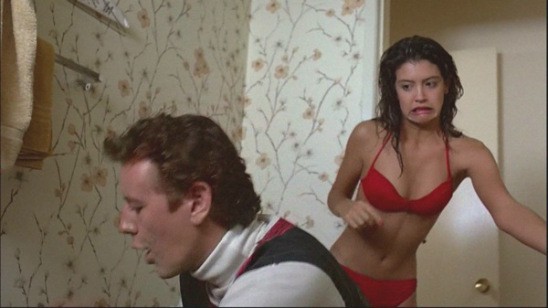The following is excerpted from Tara Ison’s book “Reeling Through Life: How I Learned to Live, Love, and Die at the
Movies.”
I’m a child of the movies, a movie freak, a film junkie; movies have
influenced my perceptions and decisions, and shaped entire aspects of my self —
they’ve taught me how to be a Jew, how to be a drunk, how to go crazy, how to
die with style, how to be a writer. I am who I am because of the movies, and I think the other movie freaks out there
are too.
Some of film’s most powerful life lessons for me, especially as a
curious and impressionable young girl, were about sex: what it was, or what it could be; what it meant, and what it could mean. In “Reeling Through Life: How I Learned to Live, Love, and Die at the
Movies” my essay
“How to Lose Your Virginity” begins with a discussion of seeing
Franco Zeffirelli’s “Romeo And Juliet” in
1976, when I was twelve years old — I fell madly in love with those two
exquisite teenagers and was wildly aroused by the innocent eroticism of their nude
morning-after love scene: “it strikes a match, triggers a longing, begins
a craving for an experience I do not know how, at twelve years old, to find or
make happen.” Wherefore art thou, my Romeo? I wanted him now.
In 1980, “Little Darlings” tempered my eager curiosity. Fifteen-year-old Kristy McNichol, in order to win
a summer camp wager, loses her virginity to Matt Dillon, an experience that
leaves her feeling profoundly sad and vulnerable: “God, I feel so lonesome,” she says afterward,
confused. She has misjudged the power of sex, not just to pleasure and create
intimacy, but — when it’s for the wrong reasons — as a possible pathway to an
emotional emptiness. I was also fifteen, and this film convinced me to hold on
to my “innocence” just a little while longer.
Amy Heckerling’s extraordinary and seminal 1982 film “Fast Times at Ridgemont High” taught
me, at a still-virginal seventeen, the most important and cautionary lesson of
all. In Universal Studios’ screenplay by Cameron Crowe as directed by
Heckerling:
LINDA: Stacy,
what are you waiting for? You’re fifteen
years old! I did it when I was thirteen.
It’s no huge thing, it’s just sex,
counsels so-mature Linda
(Phoebe Cates), The Worst Best Friend in the World, to baby-faced Stacy
(Jennifer Jason Leigh). Stacy has just started high school (filmed in the
unnamed San Fernando Valley, where I live), she and her friends work at the
Mall (the unnamed Sherman Oaks Galleria, where I spent my teenage years eating
corn dogs and buying tank tops while waiting for life to flicker on) and
everyone is singularly obsessed with sex: getting it, talking about it,
puzzling through the shifting boundaries of physical and emotional intimacy
while trying to pretend it is, of course, no
huge thing: it’s just sex.
Stacy worries whether or not she will be any good in bed, and Linda
assures her there is no such silly question of “good” or “bad”: “You either do
it, or you don’t.” The actual experience is meaningless — it’s all about
getting to list it on your resume. She is appalled that Stacy has never given a
blow job, and, with patient-teacher-voice (“It’s so easy, there’s nothing to
it, relax your throat muscles…”), gives her an impromptu lesson using a carrot
in the school cafeteria — it’s free advertising for the boys leering nearby.
There is so much pressure to do it
already, get it over with, what are you waiting for, what’s the big deal,
what’s wrong with you?
Heckerling, however, isn’t judging Stacy. This is not a “Don’t Lose Your
Virginity” story: It’s a “How Not to
Lose Your Virginity” tale. This film, so familiar to me in its geographical
landmarks and teenage angst-ridden sexual strategizing, is an instructive,
confirming deterrent. Stacy finally works up the nerve to tell Linda: “I
figured it out. I don’t want sex. Anyone can have sex” — she wants a
relationship, and romance; a screen scroll at the movie’s end tells us Stacy
and the sweet nerdy boy are still dating, but they “still haven’t gone all the
way.” And that is the coming-of-age charm that elevates “Fast Times at Ridgemont High” above the usual teen-sex-comedy fare.
On Friday, September 25, The Alliance of Women Directors presents a Seeking Our Story screening
of Amy Heckerling’s “Fast Times at Ridgemont High.” At 6pm @WomenNMedia hosts networking
and refreshments at Pitfire Pizza. Tara
Ison will introduce “Fast Times at Ridemont High” at 8pm at The Downtown
Independent Theatre.
Bio: Author Tara Ison’s book “Reeling Through Life: How I Learned to Live, Love, and Die at the Movies” looks at how film shapes identity. Through nine cleverly constructed essays, Ison explores how a lifetime of movie-watching has, for better or worse, taught her how to navigate the world and how to grapple with issues of career, family, faith, illness, sex and love. Available now through Soft Skull Press.







